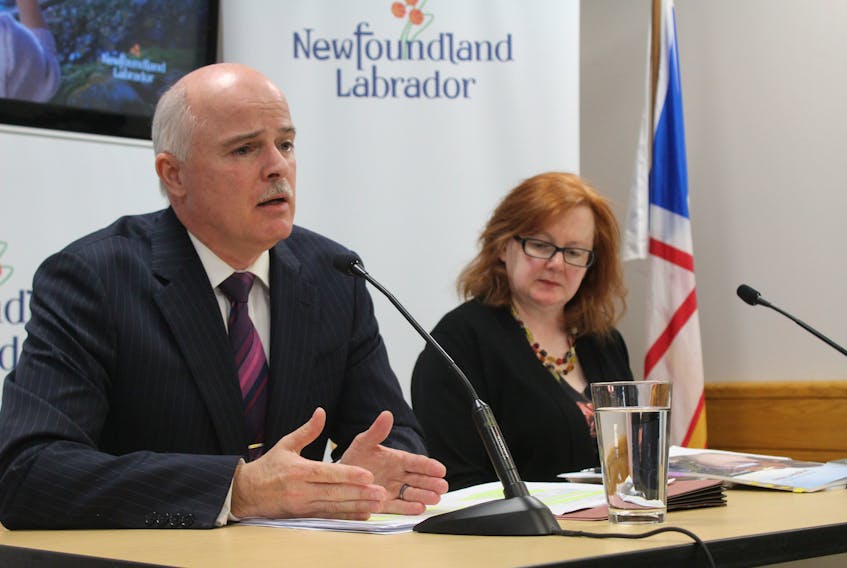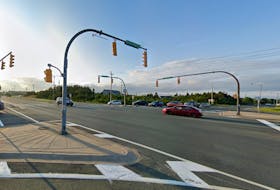ST. JOHN'S, N.L. — A $1.92-billion surplus for budget 2019 in Newfoundland and Labrador sounds exciting, but the surplus has more to do with the Atlantic Accord than it does changes in how the province is managed.
The Liberal government’s final budget before the 2019 general election boasts a $1.92-billion surplus.
Discounting the money to be received from the Atlantic Accord in the future, the surplus becomes a deficit of approximately $570 million.
Finance Min. Tom Osborne wouldn’t say if the 2019 budget document represents the Liberal campaign platform, the budget speech actually mentions the last Progressive Conservative budget in 2015 before speaking of details in the current document.
Osborne says the mention is more for context than scoring political points.
“I didn’t focus much on the past, but I do believe it’s important, if we’re going to tell a full story, then we need to tell you where we started, what we’ve done, and where we believe we’re going,” said Osborne.
“We spend a lot more time on what we’ve done, than on the past.”
The massive surplus is more of an accounting function than a direct reflection of the province’s finances. Officials with the Department of Finance said the $2.5 billion in guaranteed revenue from the Accord must be accounted for in this first year it is received because there are no restrictions on how the money can be spent by government.

“It wasn’t our choice. It’s the accounting system, accrual accounting. I would have preferred to have seen it chop away at our deficit next year and the year after and help us with surpluses every year,” said Osborne.
The 2019 budget accounts for $134 million in this fiscal year, with the remaining Accord money flowing until 2056.
Government spending increased again for the 2019 budget to $8.42 billion, up from $8.27 in last year’s budget.
Revenues did increase to $7.89 billion, with the $134 million in Atlantic Accord money factored in and future dollars left out of that calculation.
The document does not include tax and fee increases this year, but also misses large-scale decreases in taxation. The elimination of the remaining 10 per cent of taxes on auto insurance introduced in the 2016 budget is the marquee tax decrease touted by government.
Offshore oil and gas revenues are projected to remain essentially the same as in the previous budget document. The actual take from offshore oil and gas in the last budget was $1.06 billion, and is projected to increase to $1.09 billion in 2019-20, with a base estimate of $65 per barrel for oil.
While all indications point to Newfoundland and Labrador facing an outsized threat from rising sea levels compared to the rest of Canada, according to a recent report from the federal government, Osborne says as long as the world is still using oil, Newfoundland and Labrador sweet crude is a good bet.
“When all of you guys come here on bicycles or electric cars, I’ll say we’ll no longer need oil,” said Osborne.
The Atlantic Accord figures also present some differing pictures of the provincial debt numbers.
The full $2.5-billion figure counts towards the total net debt of the province, reducing it from $15.4 billion last year to $13.7 billion, but total debt for the province increased again from $21.1 billion to $22.4 billion in the 2019-20 budget document.
That means debt servicing has already increased as an expense of the province, up from $1.1 billion in 2018-19 to $1.39 billion in this year’s budget. Government will spend $836 million on K-12 education in 2019-20.
“We’ve had to borrow again, and again, and again for Muskrat Falls, so billions of dollars." — Tom Osborne
“We’ve had to borrow again, and again, and again for Muskrat Falls, so billions of dollars,” said Osborne.
“The borrowing over the last number of years has gone up considerably, because of those reasons. That borrowing has to be paid.”
Osborne says the overall spending on government departments has decreased but government is still working with agencies, boards, and commissions to implement attrition plans and to hire new workers at lesser rates.
“Last year, our spending was $8.2 billion. This year, when you take off one-time expenses, and the $130 million that’s revenue recoverable, we’re down to just shy of $8.3 billion. The increase has been very little,” said Osborne.
Meanwhile, the provincial election looms.
Osborne said it’s a better question for the premier as to whether this budget will pass in the legislature before the province heads to the polls. The Progressive Conservatives parked their campaign bus on the steps of Confederation Building in the morning, a statement that they’re not afraid of an impending election.
But, if the budget is not passed before the legislature is dissolved, it means whoever forms government after the election will ultimately have to present a second budget — whether it’s the Liberals, the Tories, the New Democrats, of the Newfoundland and Labrador Alliance.
Twitter: @DavidMaherNL









